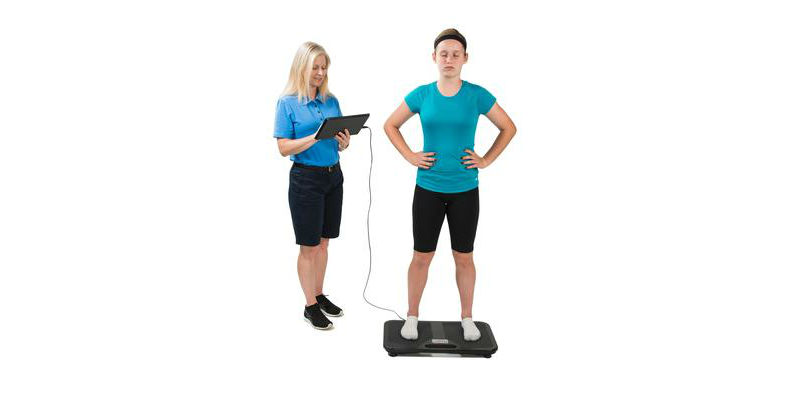When athletes get their bell rung on the field or court, there’s often tension between their desire to keep playing and a trainer’s responsibility to prevent them from further harming themselves. The problem with standard on-field concussion protocols—including the one most recently used by the National Football League—is that several of their components are subjective and prone to human error.
Researchers from San Diego State University have developed an inexpensive, ultraportable balance board called BTrackS that provides fast, objective feedback on an athlete’s balance disruption following a suspected concussion. Results from the team’s first concussion detection study have revealed that it’s about twice as effective as the most widely used balance test for concussion nationwide.

A trainer tests an athlete’s balance on the BTrackS balance board.
Current Protocols
Impaired balance is one of the major symptoms of a recent concussion. Most governing bodies in sports recommend three testing components in a concussion protocol: physical symptoms, cognitive function and balance. For the balance portion, most sports organizations use what’s known as the BESS (Balance Error Scoring System) test. Using this system, trainers ask athletes to stand in a variety of stances while remaining as still as possible. Trainers then count the number of errors—such as stepping out of stance or removing hands from the hips—and determine whether the person is likely concussed or not.
Research suggests that the BESS test accurately catches a concussion about 30 percent of the time, according to SDSU kinesiologist Dann Goble, inventor of BTrackS and first author on the study.
“The problem with the BESS is that it’s really unreliable,” Goble said. “Often you will get different scoring results from different people watching the same athlete go through the protocol.”
You can measure balance objectively using force plates that track precisely how much a person sways, but most of these devices are either very large, very expensive, or both, making them unlikely to gain traction in sports. Goble has adapted this technology into a balance board about the size of a suitcase that plugs into a computer or laptop, all for under $1,000. The project was initially supported by SDSU’s Zahn Innovation Platform Launchpad.
Put to the Test
To test whether the technology could accurately detect concussions in a real-world environment, Goble and colleagues took baseline balance measurements from more than 500 NCAA Division I student athletes at SDSU competing in a variety of sports, including football, rugby, lacrosse, soccer, basketball and water polo. Then they followed those athletes over the course of their season.
If a player sustained a head injury, trainers measured their balance using BTrackS and compared the new score to the baseline score. If the new sway score was on average more than 5 centimeters higher than baseline, then Goble’s system predicts a balance disruption indicative of concussion. Athletes also received follow-up care from a physician who could reliably diagnose whether they were concussed or not.
Of 25 athletes determined by a team physician to have received concussions, BTrackS detected 16 of them, giving Goble’s technology a success rate of 64 percent—more than twice that of the BESS test. The results were published this week in the International Journal of Sports Physical Therapy.
“We’d like to have as many sports organizations as possible switch to this better technology,” Goble said. “This device should be everywhere.”




